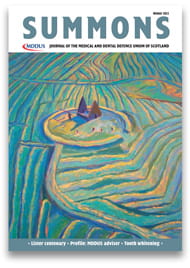AT THE RECENT Steven Lawrence murder trial one of the defendants, admitting to having made a series of lurid racist statements at his workplace, described the comments as "merely part of routine banter on the building site".
"It was done in jest and not in malice", he told the jury.
Whilst most exchanges at the workplace are unlikely to be as offensive, explicit or discriminatory as those evidenced in this court case, it is not uncommon these days for risqué or tasteless comments at work to be described by the perpetrators as “banter” – as if this excuses the offence caused and effectively portrays any complainer as having no sense of humour.
Paul MacInnes wrote recently in The Guardian pointing out how ubiquitous “banter” has become – particularly amongst young men.
“While a lot of men…. might revel in any opportunity to quip, nobody would want to be forced to do it. Yet as the term and the practice become ever–more ubiquitous … the tyranny of banter begins to grow.”
Robert Lawson, an expert in sociolinguistics at Birmingham City University, says: "I don’t think that banter is something that all men (or women) can do, but I think that it’s certainly something that’s ‘marketed’ as something that a) all men can do, and b) all men should do.
"If there is enough of a critical mass of societal pressure that banter makes you 'look good' to your mates or interlocutors, then that can be enough to make people feel they have to adopt that kind of conversational behaviour.
But employers, concerned about the impact of potentially offensive comments at the workplace, cannot afford to assume that apparently changed societal attitudes to banter will exempt their staff from legal action by victims of their “humour”.
One person’s humour could well be another person’s uncomfortable embarrassment or revulsion. Whilst this may not surprise those who attend some comedy gigs (or view "edgy" comics on TV) – indeed many may say that they actually go along assuming that their tolerance limits for such abusive language will be tested – it’s clear that the law requires employees to be more careful about joking with work colleagues.
More importantly, employers cannot afford to forget that, in addition to individual offending employees risking dismissal for discriminatory language or horseplay, the organisation itself could be held to be vicariously liable for the actions of their delinquent employees. This puts excuses like "It is only banter" into stark relief for the management of employing organisations.
The only way in which employers can avoid this vicarious liability for their employees’ discriminatory behaviour is to invoke the statutory defence outlined in the Equality Act. If the employer can show that they took all reasonable steps to prevent the offending behaviour from occurring – not that they took action after it happened – they may be able to leave the perpetrator alone facing legal action from the victim (and paying any compensation ordered by the employment tribunal).
In order to invoke that defence, Law At Work has been asked by many of our clients (including several medical and dental practices) to assist in drafting Dignity at Work policies for distribution to staff, and to provide in-house training for practice staff to explain their rights and responsibilities under discrimination law.
Clearly these organisations want to establish professional standards in their workplaces – firstly so as to avoid the risk of litigation from staff who are offended (or frightened) by extreme and unwelcome discriminatory behaviour by colleagues but, secondly, to ensure that their practice is a pleasant and welcoming place to work.
Banter in the comedy club is one thing (you can choose whether or not to expose yourself to potential offence, after all) but the workplace should be a banter-free zone – for everyone’s benefit.
Ian Watson is training services manager at Law At Work
Law At Work is MDDUS preferred supplier of employment law and health and safety services. For more information and contact details please visit www.lawatwork.co.uk
This page was correct at the time of publication. Any guidance is intended as general guidance for members only. If you are a member and need specific advice relating to your own circumstances, please contact one of our advisers.
Read more from this issue of Insight

Save this article
Save this article to a list of favourite articles which members can access in their account.
Save to library